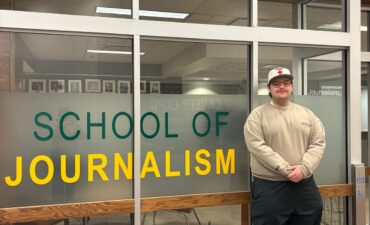
The term “fake news,” popularized by current U.S. president Donald Trump, gets thrown around a lot. But what is it? And perhaps more importantly, how can it be avoided?
“So there’s a kind of reasonable consensus among people who do psychological research on the topic,” said Gordon Pennycook, an assistant professor in behavioral science at the University of Regina, who has done research on the topic of fake news, along with his colleague David Rand.
“We’ve come up with a way to kind of operationally define it. That basically means we have a strict definition of what we mean when we say “’fake news.’ That doesn’t mean that everybody uses the same definition as us. And so the way we define it is basically something that is fabricated and completely made up but presented as if it was not.”
Pennycook brought up an example of fake news seen during the 2016 presidential elections where a website that looked like a legitimate news source published a story stating that the Pope had endorsed Trump.
Pennycook mentioned that fake news has been around for a long time, but is easier to spread due to the Internet.
“Fake news is as old as real news in the sense that people have been making shit up for a long time,” Pennycook said. “The thing that happened most recently is that, two things really, one is the Internet allows people to, anybody can create a website and make it look like an actual news website.
“It’s easier to create it. Before if you wanted to publish a fake news story you needed to be able to publish a newspaper and you’d have to have lots of money for that. There’s still tabloids, of course, but they aren’t quite the same as just making something up.”
As editor-in-chief of the University of Regina’s student newspaper “The Carillon,” John Loeppky has seen the news from inside the newsroom and as a consumer.
“As a consumer, we’re sort of inundated with it,” Loeppky said in regard to fake news. “I also find that sometimes when I’m interviewing for stories, especially on campus, I have to filter out what perhaps the source has gleaned from somewhere else that isn’t particularly reputable, so I guess you could see that as fake news.
“I think sometimes Student Union executives, while it’s not fake news, it tends to, well, they tend to be political and swing it the way they want to swing it.”
Loeppky also mentioned at times he’ll be texting back and forth with other writers he knows to let them know that they’ve been lied to by a source.
Asked if his newspaper has ever been accused of publishing fake news, Loeppky said, “I wouldn’t let fake news be printed.”
Another organization that does its best to limit fake news coverage is the CBC.
“We don’t necessarily do much to cover fake news because I think we don’t want to give more credence to it,” said CBC Saskatchewan’s managing editor David Hutton.
Instead of reporting on fake news, the CBC chooses to do some investigating into its influence.
“We do have, as the federal election comes on, CBC is putting a lot of resources into looking at how people consume news,” Hutton said, “and doing more investigations into those who are seeking to influence an election with things like fake news. So, we are putting a lot of resources as the federal election comes up into examining those fake news sources.
When it comes to avoiding fake news or being fooled by it, Pennycook has one simple suggestion.
“Look at the source,” Pennycook said. “That’s the easiest thing to do. It’s actually really easy because mainstream outlets, they may make errors every once in a while but they don’t just make things up. You’ll never get fake news from a mainstream source because they don’t just make things up.”











